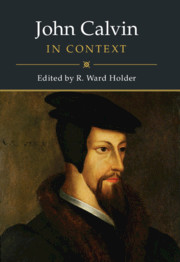Book contents
- John Calvin in Context
- John Calvin in Context
- Copyright page
- Dedication
- Contents
- Contributors
- Acknowledgments
- Abbreviations
- Introduction
- Part I France and Its Influence
- Part II Switzerland, Southern Germany, and Geneva
- Part III Empire and Society
- Part IV The Religious Question
- Part V Calvin’s Influences
- 34 Calvin and Luther
- 35 Calvin and Melanchthon
- 36 Calvin and the Swiss and South German Evangelicals
- 37 Calvin’s Friends
- 38 Calvin’s Critics
- 39 Calvin’s Lutheran Critics
- 40 Calvin’s Catholic Critics
- 41 Calvin and the Anabaptists
- Part VI Calvin’s Reception
- Conclusion
- Bibliography
- Index
- References
39 - Calvin’s Lutheran Critics
from Part V - Calvin’s Influences
Published online by Cambridge University Press: 14 November 2019
- John Calvin in Context
- John Calvin in Context
- Copyright page
- Dedication
- Contents
- Contributors
- Acknowledgments
- Abbreviations
- Introduction
- Part I France and Its Influence
- Part II Switzerland, Southern Germany, and Geneva
- Part III Empire and Society
- Part IV The Religious Question
- Part V Calvin’s Influences
- 34 Calvin and Luther
- 35 Calvin and Melanchthon
- 36 Calvin and the Swiss and South German Evangelicals
- 37 Calvin’s Friends
- 38 Calvin’s Critics
- 39 Calvin’s Lutheran Critics
- 40 Calvin’s Catholic Critics
- 41 Calvin and the Anabaptists
- Part VI Calvin’s Reception
- Conclusion
- Bibliography
- Index
- References
Summary
In the sixteenth century, the organizing effort of many Reformation leaders coalesced in a newly imagined pan-Protestant community. While differences emerged from early in the Reformation, the consistent effort to resolve disagreements attested to the desire to establish the Reformation throughout Europe. In 1540, John Calvin asserted that religious reforms for Germany could be applied to France, Spain, Italy, and elsewhere in the world, as Protestants sought “to restore those things that Christ handed down, the apostles commended, and the ancient and purer church observed,” rather than to initiate something new.1 But as the vision of a pan-Protestant church faded in the 1550s, a growing criticism of Calvin’s views emerged among later Lutherans. In the aftermath of the Augsburg Interim in 1548, which resulted in a series of intra-Lutheran debates, and the widely publicized 1549 Zürich Consensus, the organizing efforts of German Reformers shifted toward preserving the genuine Lutheran legacy of the Reformation. Such confession building had major consequences for shaping the various forms of reformation and the aspiration to come up with a unifying vision “whether historical or supernatural or both, in compensation for the constant, ad hoc negotiation of relationships.”2 The disagreement over the management of the Wittenberg legacy led to the formation of multiple legacies within Protestantism.3
- Type
- Chapter
- Information
- John Calvin in Context , pp. 345 - 354Publisher: Cambridge University PressPrint publication year: 2019

